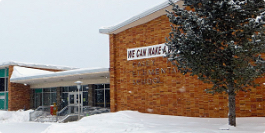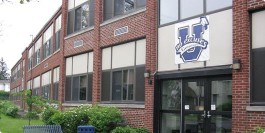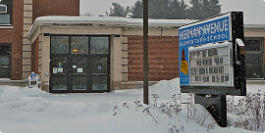* Know what you need to do each day, keep track of deadlines, due dates, test/quiz days, etc...
* Create an organizational system that works best for you, i.e. binders, color-coding, calendar, to-do lists, etc...
* Completing homework each night ensures that you get the necessary practice to learn the topic, and that you are prepared for the next class
* Take the time to prepare well for tests and quizzes, as they comprise the largest percentage of your overall grade
* Review material over several days -- cramming the night before a test is not recommended
* Stay after school with your teachers if you have questions or need clarification
* Don't be afraid to ask questions in class -- chances are other students have the same question, too
When students, parents, teachers and school counselors work together, we can help every student be successful!
Back to Top
Study Skills
Knowing how to study is half the battle when it comes to preparing for tests. Below are some tips to help you "study smarter".
1. Take better notes in class
* If the teacher puts it on the board, it's important -- write it down
* Write neatly so that you can read your notes later
* If you have a question or don't understand something, ask the teacher, and be sure to write the answer in your notes
* Do reading assignments before class, so that you know what the teacher is talking about as you're taking notes
* Compare notes with a friend to make sure you didn't miss anything important
* Stay after school with your teacher if you missed anything or need clarification
* Always obtain a copy of class notes if you were absent, from a friend or your teacher
2. Read smarter
* Read twice. The first time through, skim for headings, subheadings, boldfaced words, charts, graphs, etc..., then go back and read the text slowly, asking yourself why the information is important as you go
* Instead of highlighting important sentences or information, copy them in your notebook along with the textbook page where you found it
* Answer questions at the end of chapters, even if your teacher doesn't assign them
3. Don't cram for tests
* Break down the material into manageable chunks and study over several days
* Turn your notes into flash cards, with a question on one side and the answer on the other
* Focus on larger concepts first to be sure you understand them, then focus on smaller details
4. Control your environment
* Don't try to study in a noisy, distracting area -- find a quiet, comfortable place where you can focus
* Turn off your cell phone, video games, and TV while studying
* Study when you're fed and rested -- give yourself plenty of time to cover the material
Back to Top
Regents Test Preparation
Below are links to Regents test prep services, to help students prepare and practice for their Regents exams in:
Comprehensive English
Global Studies
US History
Algebra
Geometry
Algebra 2 & Trigonometry
Earth Science
Living Environment (Biology)
Chemistry
Physics
Free Services:
Past Regents Exams and Scoring Keys for Practice
***Students are also encouraged to attend any and all review sessions offered by their teachers to help prepare for exams.***
Fee-Based Services:
(we do not endorse any particular company or service)
Beating Test Anxiety & Test Taking Tips
Test anxiety is a common problem, especially in this world of high-stakes testing that we live in. Whether it be ten-minute quizzes or three-hour exams, tests can cause students to worry too much about their performance, which in turn can negatively affect that performance. Below are some helpful links about overcoming test anxiety and preparing well.
Why Do Homework?
Although students often think that homework is just an adult-contrived punishment to make them miserable, there really are very important reasons why homework is necessary for success.
Practice
No one would ever expect an athlete or musician to learn and improve their skills without practice -- it just isn't possible. The same holds true for academics. In the classroom, information is presented and explained, but homework gives the student the chance to apply and practice what was learned in class, so that the information can stay in long-term memory and truly become part of a student's knowledge base.
Preparation
Completion of homework ensures that a student is ready for the next day's class, can follow along with the lesson, and can actively contribute to discussion. When students are prepared, they feel more involved, confident, and energized in the classroom. Conversely, it is very difficult for students to be engaged in their own learning when they don't know what's going on -- this can then lead to frustration, poor behavior, and lack of interest in school.
Reinforcement
Successful application of knowledge to various situations is what truly leads to learning. Homework gives students the opportunity to apply what they learned in class to new and different problems. In that way, the information makes more sense and becomes ingrained, and students gain confidence in their problem-solving skills.
Personal Development
School is an important training ground for life, and students can learn crucial life skills through the academic requirements and expectations we place on them. Homework, for example, teaches personal responsibility, time management, perseverance, and a solid work ethic, which are necessary skills for a successful life.
Enhancement
Homework enhances learning by providing opportunities to experience more than what can be covered in a 40-minute class. For example, a science teacher gives a lesson on the structure and function of the leaf. For homework, students are asked to go outside and collect several different types of leaves, compare them, then write down their observations. The students who complete this homework assignment will have discovered real-life relevance in the lesson, and their knowledge of leaves will be enhanced beyond what was taught in the classroom.
Grades
Homework is collected and graded to provide the teacher with evidence that the student has mastered the material, but also to give the student an incentive to complete homework. It's like a free grade to boost one's overall average.
Simply put, those who complete their homework every day will learn more and have better grades.
SO DO YOURSELF A FAVOR...DO YOUR HOMEWORK! :)
Back to Top
Calculating Grades
GPA/Rank in Class
Grade point average and rank are computed after the sixth semester using all courses for which a numerical average is recorded. Please note that class rank and GPA includes Physical Education. Both GPA and rank in class are weighted. When calculating rank, the weighting formula adds 5% to the final average in enriched, AP, and college credit courses taught on site at Auburn High School. (Note: College courses taken “off site” or on the Internet will not be weighted for GPA or class rank, i.e., New Visions English).
Marking Period Vertical Average
For each marking period, a straight average is calculated by adding up the grades in the marking period column of the report card, then dividing by the number of classes listed. The vertical average is used to determine extracurricular and athletic eligibility, as well as placement on honor roll and high honor roll.
Course Final Average Calculation
For a full-year course, the average of the six marking periods is 75% of the final average, and the final exam is 25% of the final average. For example, if marking period grades are as follows:
65 + 72 + 75 + 82 + 80 + 78 = 452/6 = 75.33 (marking period average)
Final exam grade: 65 MP average 75.33 x 3 + 65 (exam) /4 = Final average 72.75
For a half-year course, take the average of the three marking periods, multiply by three, add the final exam grade and divide by four.
Back to Top









